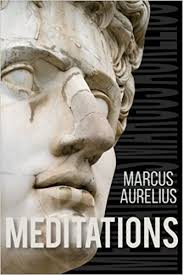Meditations Page #14
Meditations is a series of personal writings by Marcus Aurelius, Roman Emperor from 161 to 180 AD, recording his private notes to himself and ideas on Stoic philosophy. Marcus Aurelius wrote the 12 books of the Meditations in Koine Greek as a source for his own guidance and self-improvement.
XI. Hast thou reason? I have. Why then makest thou not use of it? For if thy reason do her part, what more canst thou require? XII. As a part hitherto thou hast had a particular subsistence: and now shalt thou vanish away into the common substance of Him, who first begot thee, or rather thou shalt be resumed again into that original rational substance, out of which all others have issued, and are propagated. Many small pieces of frankincense are set upon the same altar, one drops first and is consumed, another after; and it comes all to one. XIII. Within ten days, if so happen, thou shalt be esteemed a god of them, who now if thou shalt return to the dogmata and to the honouring of reason, will esteem of thee no better than of a mere brute, and of an ape. XIV. Not as though thou hadst thousands of years to live. Death hangs over thee: whilst yet thou livest, whilst thou mayest, be good. XV. Now much time and leisure doth he gain, who is not curious to know what his neighbour hath said, or hath done, or hath attempted, but only what he doth himself, that it may be just and holy? or to express it in Agathos' words, Not to look about upon the evil conditions of others, but to run on straight in the line, without any loose and extravagant agitation. XVI. He who is greedy of credit and reputation after his death, doth not consider, that they themselves by whom he is remembered, shall soon after every one of them be dead; and they likewise that succeed those; until at last all memory, which hitherto by the succession of men admiring and soon after dying hath had its course, be quite extinct. But suppose that both they that shall remember thee, and thy memory with them should be immortal, what is that to thee? I will not say to thee after thou art dead; but even to thee living, what is thy praise? But only for a secret and politic consideration, which we call oikonomian or dispensation. For as for that, that it is the gift of nature, whatsoever is commended in thee, what might be objected from thence, let that now that we are upon another consideration be omitted as unseasonable. That which is fair and goodly, whatsoever it be, and in what respect soever it be, that it is fair and goodly, it is so of itself, and terminates in itself, not admitting praise as a part or member: that therefore which is praised, is not thereby made either better or worse. This I understand even of those things, that are commonly called fair and good, as those which are commended either for the matter itself, or for curious workmanship. As for that which is truly good, what can it stand in need of more than either justice or truth; or more than either kindness and modesty? Which of all those, either becomes good or fair, because commended; or dispraised suffers any damage? Doth the emerald become worse in itself, or more vile if it be not commended? Doth gold, or ivory, or purple? Is there anything that doth though never so common, as a knife, a flower, or a tree? XVII. If so be that the souls remain after death (say they that will not believe it); how is the air from all eternity able to contain them? How is the earth (say I) ever from that time able to Contain the bodies of them that are buried? For as here the change and resolution of dead bodies into another kind of subsistence (whatsoever it be;) makes place for other dead bodies: so the souls after death transferred into the air, after they have conversed there a while, are either by way of transmutation, or transfusion, or conflagration, received again into that original rational substance, from which all others do proceed: and so give way to those souls, who before coupled and associated unto bodies, now begin to subsist single. This, upon a supposition that the souls after death do for a while subsist single, may be answered. And here, (besides the number of bodies, so buried and contained by the earth), we may further consider the number of several beasts, eaten by us men, and by other creatures. For notwithstanding that such a multitude of them is daily consumed, and as it were buried in the bodies of the eaters, yet is the same place and body able to contain them, by reason of their conversion, partly into blood, partly into air and fire. What in these things is the speculation of truth? to divide things into that which is passive and material; and that which is active and formal. XVIII. Not to wander out of the way, but upon every motion and desire, to perform that which is just: and ever to be careful to attain to the true natural apprehension of every fancy, that presents itself. XIX. Whatsoever is expedient unto thee, O World, is expedient unto me; nothing can either be 'unseasonable unto me, or out of date, which unto thee is seasonable. Whatsoever thy seasons bear, shall ever by me be esteemed as happy fruit, and increase. O Nature! from thee are all things, in thee all things subsist, and to thee all tend. Could he say of Athens, Thou lovely city of Cecrops; and shalt not thou say of the world, Thou lovely city of God? XX. They will say commonly, Meddle not with many things, if thou wilt live cheerfully. Certainly there is nothing better, than for a man to confine himself to necessary actions; to such and so many only, as reason in a creature that knows itself born for society, will command and enjoin. This will not only procure that cheerfulness, which from the goodness, but that also, which from the paucity of actions doth usually proceed. For since it is so, that most of those things, which we either speak or do, are unnecessary; if a man shall cut them off, it must needs follow that he shall thereby gain much leisure, and save much trouble, and therefore at every action a man must privately by way of admonition suggest unto himself, What? may not this that now I go about, be of the number of unnecessary actions? Neither must he use himself to cut off actions only, but thoughts and imaginations also, that are unnecessary for so will unnecessary consequent actions the better be prevented and cut off. XXI. Try also how a good man's life; (of one, who is well pleased with those things whatsoever, which among the common changes and chances of this world fall to his own lot and share; and can live well contented and fully satisfied in the justice of his own proper present action, and in the goodness of his disposition for the future:) will agree with thee. Thou hast had experience of that other kind of life: make now trial of this also. Trouble not thyself any more henceforth, reduce thyself unto perfect simplicity. Doth any man offend? It is against himself that he doth offend: why should it trouble thee? Hath anything happened unto thee? It is well, whatsoever it be, it is that which of all the common chances of the world from the very beginning in the series of all other things that have, or shall happen, was destinated and appointed unto thee. To comprehend all in a few words, our life is short; we must endeavour to gain the present time with best discretion and justice. Use recreation with sobriety.
Translation
Translate and read this book in other languages:
Select another language:
- - Select -
- 简体中文 (Chinese - Simplified)
- 繁體中文 (Chinese - Traditional)
- Español (Spanish)
- Esperanto (Esperanto)
- 日本語 (Japanese)
- Português (Portuguese)
- Deutsch (German)
- العربية (Arabic)
- Français (French)
- Русский (Russian)
- ಕನ್ನಡ (Kannada)
- 한국어 (Korean)
- עברית (Hebrew)
- Gaeilge (Irish)
- Українська (Ukrainian)
- اردو (Urdu)
- Magyar (Hungarian)
- मानक हिन्दी (Hindi)
- Indonesia (Indonesian)
- Italiano (Italian)
- தமிழ் (Tamil)
- Türkçe (Turkish)
- తెలుగు (Telugu)
- ภาษาไทย (Thai)
- Tiếng Việt (Vietnamese)
- Čeština (Czech)
- Polski (Polish)
- Bahasa Indonesia (Indonesian)
- Românește (Romanian)
- Nederlands (Dutch)
- Ελληνικά (Greek)
- Latinum (Latin)
- Svenska (Swedish)
- Dansk (Danish)
- Suomi (Finnish)
- فارسی (Persian)
- ייִדיש (Yiddish)
- հայերեն (Armenian)
- Norsk (Norwegian)
- English (English)
Citation
Use the citation below to add this book to your bibliography:
Style:MLAChicagoAPA
"Meditations Books." Literature.com. STANDS4 LLC, 2025. Web. 24 Feb. 2025. <https://www.literature.com/book/meditations_76>.








Discuss this Meditations book with the community:
Report Comment
We're doing our best to make sure our content is useful, accurate and safe.
If by any chance you spot an inappropriate comment while navigating through our website please use this form to let us know, and we'll take care of it shortly.
Attachment
You need to be logged in to favorite.
Log In